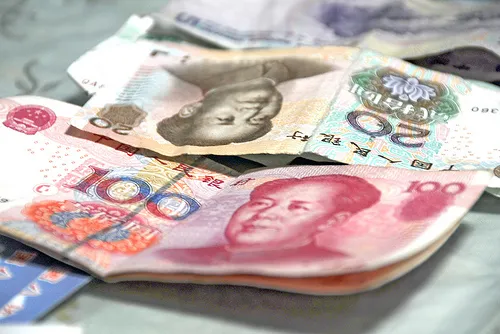
RMB gaining traction as global trade and investment currency
HSBC survey shows Chinese corporates increasingly prefer RMB for trading and investing.
Interviewed mainland firms showed confidence in the future of RMB as a major global trade and investment currency. The vast majority (77%) of Chinese corporates surveyed expect one-third of all Chinese trade (circa USD 2trn) to be conducted in RMB by 2015 (vs 10% YTD) and 30% plan to use RMB for investment-related purposes in the next 12 months.
The survey also identified a clear cost advantage to businesses outside Mainland China that choose to settle their trade in RMB. Half of all Chinese corporates stated they were willing to offer better pricing or terms in return for using RMB to settle trade: 41% revealed they would be willing to offer discounts of up to 3% and 9% willing to offer even greater discounts.
Noel Quinn, Regional Head of Commercial Banking Asia Pacific, said: “As Mainland authorities develop their regulatory framework to open up and internationalise the currency, the use of RMB in cross-border business has expanded both within trade and beyond. We continue to connect customers in China to opportunities overseas and are seeing increased demand for the use of RMB as a transaction currency. International businesses looking to benefit from China’s growth must explore the benefits of using the RMB when transacting with their Chinese counterparts to take full advantage of discounts that may be available.”
Moves by the Chinese government to increase exchange rate flexibility and simplify transaction processing have changed the dynamics of cross-border RMB business. The proportion of corporates using RMB because they expect the currency to appreciate has fallen dramatically. Only 25% of respondents said they used RMB in order to benefit from currency appreciation in 2012, compared to significant 44% in 2011.
Instead, China-based corporates reported that exchange risk management and operational convenience were the main reasons for choosing RMB for cross-border transactions. Seventy-two per cent of those surveyed use RMB to help manage their foreign exchange risks, a sharp increase from 49% in 2011 and 44% stated that the currency brought operational and accounting advantages (vs 34% in 2011).
While import and export transactions were the most common type of RMB business that respondents engaged in (47% and 42%, respectively), the survey revealed that 30% plan to use RMB for other purposes in the next 12 months. Fifteen per cent of corporates said they intend to use RMB for capital injections, 11% plan to use it for offshore loans and 4% for cross-border acquisitions (vs 11%, 8% and 1% who used RMB for these purposes in 2011, respectively).
Montgomery Ho, Head of Commercial Banking HSBC China, said: “It is encouraging to see the RMB being increasingly chosen by businesses on its merits as a trade and capital investment currency. Mainland corporates are adapting to increased exchange rate flexibility and are benefitting from streamlined RMB transaction processes. The internationalisation of RMB is a natural process that is being driven by China's economic growth and trade development, and we are confident that the Chinese currency is on track to becoming a major trade currency by 2015.”
Chinese corporates also reported that their counterparties overseas are finding it increasingly convenient to use RMB. Only 15% reported that their counterparties encountered insufficient RMB service or support from their bank overseas, down from 23% per cent in 2011. Overseas business also experienced increasingly easy access to RMB liquidity over the past year, with only 14% reporting that their overseas counterparties lacked sources of RMB, or lacked use for RMB funds received, compared to 21% in 2011.



![SBR 5 Lorem Ipsum News 2 [8 May]](https://cmg-qa.s3.ap-southeast-1.amazonaws.com/s3fs-public/styles/exclusive_featured_article/public/2025-05/a_hand_pointing_to_a_futuristic_technology_5b87c9d0e3_3.png.webp?itok=M3Hf-9XR)
![SBR 4 Lorem Ipsum [8 May Top Stories]](https://cmg-qa.s3.ap-southeast-1.amazonaws.com/s3fs-public/styles/exclusive_featured_article/public/2025-05/a_hand_pointing_to_a_futuristic_technology_5b87c9d0e3_2.png.webp?itok=2m5Wl0MX)


![Exclusive three SBR 12 Lorem Ipsum [8 May]](https://cmg-qa.s3.ap-southeast-1.amazonaws.com/s3fs-public/styles/exclusive_featured_article/public/2025-05/a_hand_pointing_to_a_futuristic_technology_5b87c9d0e3_11.png.webp?itok=8kn_UIfA)
![SBR 3 Lorem Ipsum [ Exclusive 2]](https://cmg-qa.s3.ap-southeast-1.amazonaws.com/s3fs-public/styles/exclusive_featured_article/public/2025-05/a_hand_pointing_to_a_futuristic_technology_5b87c9d0e3_1.png.webp?itok=YCyjLegJ)
![SBR 2 Lorem Ipsum [8 May]](https://cmg-qa.s3.ap-southeast-1.amazonaws.com/s3fs-public/styles/exclusive_featured_article/public/2025-05/a_hand_pointing_to_a_futuristic_technology_5b87c9d0e3_0.png.webp?itok=_cKD-29o)

![Video [Event News]](https://cmg-qa.s3.ap-southeast-1.amazonaws.com/s3fs-public/styles/event_news_featured_article/public/2025-05/screenshot-2025-05-08-at-4.58.53-pm_0.png.webp?itok=Kud35sMs)
![Event News SBR 9 Lorem Ipsum [8 may]](https://cmg-qa.s3.ap-southeast-1.amazonaws.com/s3fs-public/styles/event_news_thumbnail/public/2025-05/a_hand_pointing_to_a_futuristic_technology_5b87c9d0e3_8.png.webp?itok=DTh_dbYp)
![Event News SBR 9 Lorem Ipsum [8 May]](https://cmg-qa.s3.ap-southeast-1.amazonaws.com/s3fs-public/styles/event_news_thumbnail/public/2025-05/a_hand_pointing_to_a_futuristic_technology_5b87c9d0e3_7.png.webp?itok=vzDAzb6V)
![Event News SBR 8 Lorem Ipsum [8 May]](https://cmg-qa.s3.ap-southeast-1.amazonaws.com/s3fs-public/styles/event_news_thumbnail/public/2025-05/a_hand_pointing_to_a_futuristic_technology_5b87c9d0e3_6.png.webp?itok=jvHFc4P6)
![Video [Event News]](https://cmg-qa.s3.ap-southeast-1.amazonaws.com/s3fs-public/styles/video_thumbnail/public/2025-05/screenshot-2025-05-08-at-4.58.53-pm_0.png.webp?itok=yZnI0YBb)
![Video 1 SBR [8 May]](https://cmg-qa.s3.ap-southeast-1.amazonaws.com/s3fs-public/styles/video_thumbnail/public/2025-05/screenshot-2025-05-08-at-4.58.53-pm.png.webp?itok=9AAeRz_k)

 Advertise
Advertise

